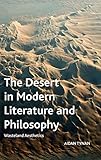The Desert in Modern Literature and Philosophy : Wasteland Aesthetics / Aidan Tynan.
Material type: TextSeries: Crosscurrents : CROSSPublisher: Edinburgh : Edinburgh University Press, [2022]Copyright date: ©2020Description: 1 online resource (264 p.)Content type:
TextSeries: Crosscurrents : CROSSPublisher: Edinburgh : Edinburgh University Press, [2022]Copyright date: ©2020Description: 1 online resource (264 p.)Content type: - 9781474443357
- 9781474443371
- 809.9332154
- online - DeGruyter
| Item type | Current library | Call number | URL | Status | Notes | Barcode | |
|---|---|---|---|---|---|---|---|
 eBook
eBook
|
Biblioteca "Angelicum" Pont. Univ. S.Tommaso d'Aquino Nuvola online | online - DeGruyter (Browse shelf(Opens below)) | Online access | Not for loan (Accesso limitato) | Accesso per gli utenti autorizzati / Access for authorized users | (dgr)9781474443371 |
Frontmatter -- Contents -- Series Editor’s Preface -- Acknowledgements -- Introduction -- 1. Desert Desire -- 2. Desert Immanence -- 3. Desert Refrains -- 4. Desert Islands -- 5. Desert Polemologies -- Conclusion: Beyond the Carbon Imaginary -- Bibliography -- Index
restricted access online access with authorization star
http://purl.org/coar/access_right/c_16ec
Shows how philosophers from Nietzsche to Deleuze have used the figure of the desert to theorise space and placeUses the figure of the desert to provide an aesthetic theory of modernityRethinks and challenges key assumptions of ecocriticismOffers readings of the most significant literary deserts using an innovative and rigorous theoretical framework Provides an original account of the Anthropocene from a cultural perspectiveRead an interview between Aiden Tynan and Crosscurrents series editor Christopher WatkinAidan Tynan provocatively rethinks some of the core assumptions of ecocriticism and the environmental humanities. Showing the significance of deserts and wastelands in literature since the Romantics, he argues that the desert has served to articulate anxieties over the cultural significance of space in the Anthropocene.From imperial travel writing to postmodernism, from the Old Testament to salvagepunk, the desert has been a terrain of desire over which the Western imagination of space and place has ranged. As our planetary ecological crisis heads in increasingly catastrophic directions, this critique of the figure of the desert in literature, philosophy and wider culture can help us map an environmental affect that finds itself both attracted to and repelled by arid, depopulated and barren landscapes of various kinds. Philosophers crucial to understanding our contemporary environmental condition make extensive use of the desert as a conceptual topography, a place of thought. Nietzsche’s warning that ‘the desert grows’ has been taken up by Heidegger, Derrida and Deleuze in their critiques of modernity. Tynan engages this philosophical work through a range of 20th and 21st century art and literature, and provides new interpretations of the most significant literary deserts from T.S Eliot to Don DeLillo. "
Mode of access: Internet via World Wide Web.
In English.
Description based on online resource; title from PDF title page (publisher's Web site, viewed 29. Jun 2022)


